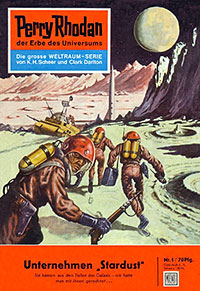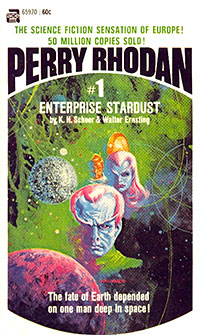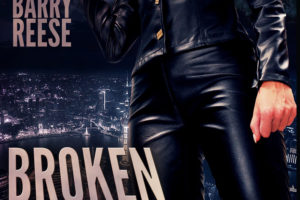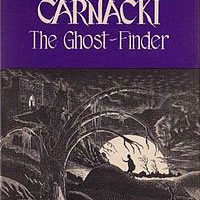 I have heard that in Germany, science fiction is divided into “Perry Rhodan” and “everything else.”
I have heard that in Germany, science fiction is divided into “Perry Rhodan” and “everything else.”
But who is Perry Rhodan? He’s the star of probably one of the longest space opera series ever — that sadly has had only a few works published in the United States. And in my opinion, the series is pure pulp.
Started in the 1960s, the Perry Rhodan series was created by K.H. Scheer and Walter Ernsting/Clark Darlton (and written by them and a cadre of authors) to be a series of some 30 works, but it continues to be published today, now over 2,700 novels, with spin-off series like “Atlan”, the “Planet Novels” and others, and most recently a new series, “Perry Rhodan Neo”, which reboots the series with the action starting in 2036.
The series centers on Perry Rhodan, an American astronaut who leads the first expedition to the moon in the future of 1971. There they find a spacecraft of the Arkonide race, a humanoid race that we much later learn is related to the human race (and that many other humanoid races of the universe are somehow interrelated).
The Arkonides are very advanced, but their empire is in decline, such that the empire is now ruled by a supercomputer, the Robot Regent. The main Arkonides, scientist Khrest and the female commander Thora (who would later become Rhodan’s first wife), seek Rhodan’s help. Rhodan sees this as an opportunity to unite humanity.
He soon takes the technology of the Arkonides back to Earth, lands in the Gobi Desert, and declares the “Third Power” (called “New Power” in the U.S. edition) preventing World War III that was brewing. Soon teaming up with a cadre of mutants (they have mental abilities like telepathy, teleportation, precognition and the like), he works to unite the world into one power, not an easy task.
Mankind is soon colonizing the rest of the solar system, becoming a growing power, and more. Perry and select others are even made immortal, thanks to a “superintelligence” known only as IT. And this all (and I left a lot out) in the first 50 or so works that form the first “cycle” of stories.
The next cycle skips ahead several decades, and Earth is now the Solar Imperium under the leadership of Rhodan, and Perry soon meets the near-immortal Atlan, an Arkonide from the distant past who is the founder of the Arkonide colony of Atlantis, and who had been in hibernation on Earth. He becomes a valued ally and soon the new ruler of the Arkonide Empire.
The overall series has arcs or cycles that can run 25 to 100 stories, with several such cycles making up “grand cycles.” In the U.S., the initial works got through (almost) three cycles. Since many of the main characters (Perry and many of his associates) are immortal, this allows the series to jump ahead several decades or more for the next cycle of stories, moving us hundreds or even thousands of years into the future.
The series would spawn comics, audio plays, even a movie in the 1960s called “Mission: Stardust.”
 The well-known sf editor and collector Forest Ackerman soon worked to bring Perry Rhodan to the U.S. Stories were translated by his wife and others (some say they were better than the original German) and published by Ace Books. Additional material was added, and I’ve heard stories that it was the other materials that really sold the “maga-books” as they were called. But some felt the series too juvenile and Ace pulled the plug even though it was a great seller. Another 20 or so stories were published by subscription only, but even that was ended by the German publisher, four stories short of the current cycle.
The well-known sf editor and collector Forest Ackerman soon worked to bring Perry Rhodan to the U.S. Stories were translated by his wife and others (some say they were better than the original German) and published by Ace Books. Additional material was added, and I’ve heard stories that it was the other materials that really sold the “maga-books” as they were called. But some felt the series too juvenile and Ace pulled the plug even though it was a great seller. Another 20 or so stories were published by subscription only, but even that was ended by the German publisher, four stories short of the current cycle.
Another fan tried a go in the 1990s, publishing four stories starting with #1800, and hoping to publish the final four stories of that unfinished cycle, before the German publisher again pulled the plug. FanPro was going to publish the six-part “Lemuria” miniseries, but only got the first volume out. I can’t understand why in this day of print-on-demand that the German publisher can’t work out something to bring Perry Rhodan back to the U.S.
No, the series is not high literature, but I found the earlier series fun. And sometimes that’s what you need in science fiction. Maybe someone will wise up and we will be able to enjoy the series again.
I like the work that Black Coat Press is doing in bringing some interesting French (and other European) sf/pulp works into America. But as long as the German publisher has an inflated view of the value of Perry Rhodan and is unwilling to work with a similar smaller press, nothing will happen it seems.
But if you look, you should be able to find the American editions.
UPDATES:
Since this posting, the German publisher has put out some ebook editions in English which you may purchase from Amazon. This includes the 6-part “Lemuria” series as well as the first five of the “Perry Rhodan Neo” series, which has over 260 issues in German. The main Perry Rhodan series has about 3000 issues. Sadly, nothing yet in print. I really with they would team up with a small press here in the US to put our print on demand omnibus editions.




Great article! Just a few weeks ago, after years of working on it, I was able to complete my collection of the US paperbacks. I think you keyed in on the main attraction of the Rhodan series, great characters that are just plain fun to read!
Yeah, I always thought that Perry Rhodan was the next natural evolution of the science-fictional superhero. Just like Edmond Hamilton’s Captain Future took the basic Buck Rogers/Flash Gordon formula and cranked it up a notch, and in the brief lifespan of that character he went from being “Hero of the Solar System” to “Savior of the Universe”, dealing with menaces on a cosmic level, so Perry Rhodan just keeps upping the cosmic stakes. It’s been said that during its run the series has left no science-fictional concept untouched. Rhodan does make Captain James T. Kirk look like a dilettante.
I love that the series maintained that ‘alternate future’ timeline intact, even after 10 years of stories, when it diverged from our world’s history with the Apollo 11 moon landing. I will also agree that Ackerman’s idea of a “magabook” (all the features of a magazine: backup short stories, articles and letter column, in paperback format) really grabbed me, and set the series apart from other science fiction and hero pulp reprint series of the 1970s. I still have NESFA’s 2-part “Index to the Perry Rhodan Series” floating around the house somewhere. Even if some American publisher were to reprint the series from the beginning today, I doubt if it would be as much fun as the Ackerman-edited Ace Books series, without those extra features.